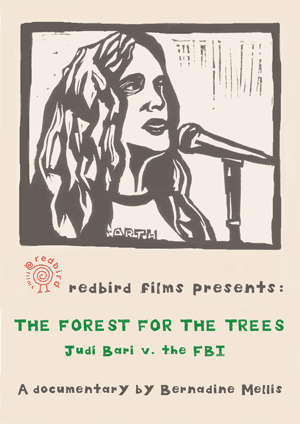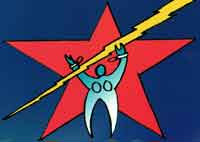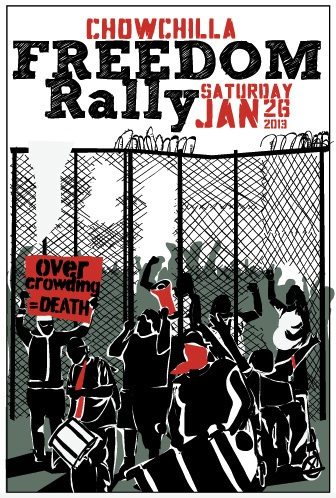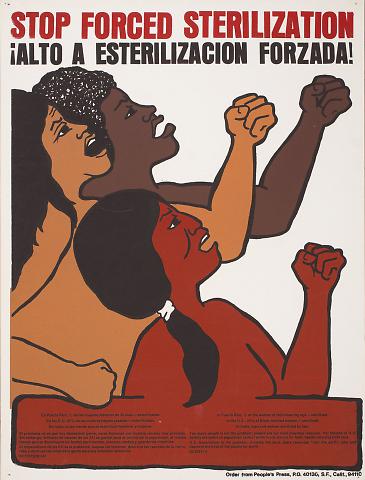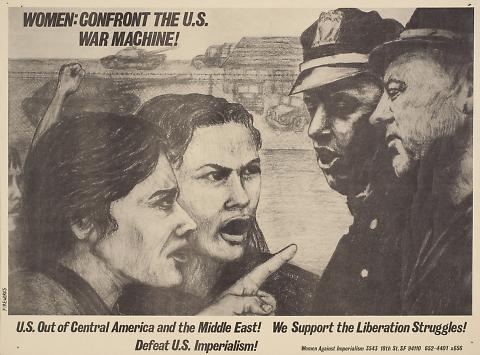Gender and Sexuality
This collection features materials from a number of sources focusing on struggles revolving around gender and sexuality. These struggles are not separate from larger struggles for liberation but specifically incorporate unique voices and perspectives.
Subcollections
-
Connexions
Connexions is the collective product of feminists of diverse nationalities and political perspectives committed to contributing to an international women\'s movement. -
Feminist and Lesbian Politics: Monographs-Periodicals-Articles
This collection contains materials focusing on radical feminist and lesbian politics. While diverse in medium and subject matter, this collection contextualizes women’s liberation highlighting issues of class, race, sexuality and imperialism. -
Materials shot and collected in the making of The Forest for the Trees
Raw materials from the documentary "The Forest for the Trees" which details the amazing story of the fight to clear Earth First! activist Judi Bari's name after her car was bombed and she was arrested as a terrorist. -
Out of Control: Lesbian Committee to Support Women Prisoners
Out of Control (OOC) was a self-supporting committee formed in 1987 to organize resistance to the Lexington Control Unit for women. -
Prisons - Women
This collection contains materials relating to the specific conditions, challenges and struggles facing women in prison. Topics are varied but materials include conference papers, informational materials, legal perspectives and audio recordings. -
Programs produced by Judy Gerber and Laurie Simms
This collection contains grassroots radio programming produced by Judy Gerber and Laurie Simms. This programming primarily occurred during the 1980s and 1990s. -
Sterilization
This collection contains materials focusing on the sterilization of women and efforts to resist this practice. -
Violence Against Women
This collection contains materials focusing on violence against women. Specific topics covered include women who fight back against their abusers, rape, pornography, sexism and self-defense. -
Women Against Imperialism
Women Against Imperialism was a grassroots, feminist, anti-imperialist solidarity organization formed in San Francisco in 1981. Women Against Imperialism’s work primarily consisted of direct action organizing and political education activities.
Documents
9 Documents Found
Call Number: JG/ 076BFormat: Cass BProducers: Judy GerberProgram: A Defiant HeartCollection: Programs produced by Judy Gerber and Laurie Simms
Part one of a Speech by Victor Hugo Tenoco, former Vice Foreign Minister of the Sandinista Government in Nicaragua, delivered at Georgia State University in 1991. Tenoco summarizes the process of the FSLN to work for "democracy and justice" during its ten year rule in Nicaragua. He surveys the long history and ideology of the Sandinista movement and discuses the party's fall from power, particularly its "unavoidable" collision course with U.S. neoconservatism. He also discuses the implications for the "revolution" with the Sandinistas' loss of national leadership and the important role they will continue to play in Nicaraguan politics as a democratic and grassroots party.
Call Number: JG/ 077AFormat: Cass AProducers: Judy GerberProgram: A Defiant HeartCollection: Programs produced by Judy Gerber and Laurie Simms
Part two of a speech by Victor Hugo Tenoco, former Vice Foreign Minister of the Sandinista Government in Nicaragua, delivered at Georgia State University in 1991. Tenoco argues that Nicaragua today faces two major problems: democracy and reconciliation and economic recovery. The FSLN needs to serve as constructive opposition to the ruling government. He argues that democracy and reconciliation have made great progress in Nicaragua with the disbanding of the Contras but that the economic problems of the country still loom large for the future. The FSLN is in a difficult position of balancing national interests in economic reconstruction and protecting the concrete interests of the poor. He sees aide as unavoidable. The question remains whether U.S. aide will simply service the national debt or go to rebuild the Nicaraguan economy.
Date: 2/22/1991Call Number: JG/ 079BFormat: Cass BProducers: Judy GerberProgram: A Defiant HeartCollection: Programs produced by Judy Gerber and Laurie Simms
Reading of a 'Barricada' International Editorial, from February 2, 1991 on the war on the Middle East. The FSLN was involved in diplomatic efforts before the outbreak of war. They call US actions a "genocide in the name of peace." They argue that the military- industrial complex is all the U.S. has going for it so it is logical that we resort to force. They question who can stop the U.S. from punishing competitors. Also from 'Barricada,' a discussion of the controversy that Sandinista officers sold missiles to El Salvador's FMLN. They argue that while the FSLN has a moral commitment to El Salvador, the sale of arms attacks political institutions.
Call Number: JG/ 080BFormat: Cass BProducers: Judy GerberCollection: Programs produced by Judy Gerber and Laurie Simms
Bonpane discusses many topics of the day (recorded October 1990). 1. Sen. Pete Wilson refuses to see him and representatives of Salvadorian community regarding House Resolution #5114 and the Casden-Graham provision. 2. Brian Wilson, who lost his legs trying to stop a munitions shipment to El Salvador, informs of a peace delegation underway to Iraq. 3. Bonpane reads open letter from Mennonites to the people of Iraq. 4. Responds to Democratic National Committee Chair Ron Brown's statement regarding Democratic support for war in Iraq. 5. Informs of 10-day Human Rights delegation to Mexico. 6. Informs of Reverend Father Ernesto Cardenal Martínez's upcoming visit to Los Angeles. 7. Bonpane reads a letter from Jeffrey Patterson who refused to serve in the military action in Iraq.
Date: 3/2/1990Call Number: JG/ 084Format: CassetteProducers: Judy GerberProgram: A Defiant HeartCollection: Programs produced by Judy Gerber and Laurie Simms
Episode from the Atlanta Committee on Latin America of a reading of a February 27 communiqué from the Secretariat of the National Directorate of the FSLN regarding the outcome of the February 25 National Elections. The FSLN declares the elections to be the first free and honest since the rise of the FSLN; they declare that the FSLN retains its responsibility to guard the revolution in the wake of the loss. In particular, they swear to protect nationalized banks and properties and agrarian, labor, and speech freedoms. Interviews with Giaconda Robinson and Pat Clark of Nicaragua Network (U.S.) where they speak about the people's reaction to the FSLN's defeat, the Contra war and US aggression. Interview with Phoebe Hersch of Coyote News Network as well.
Date: 3/5/1995Call Number: JG/ 087BFormat: Cass BProducers: Judy GerberProgram: A Defiant HeartCollection: Programs produced by Judy Gerber and Laurie Simms
Interview with Judy Siff of the Prairie Fire Organizing Committee who speaks of the creation, destruction and recreation of International Women's Day. It is a day when women recognize women who are in struggle around the world. Siff advocates visiting women in prison and describes the situation of Laura Whitehorn, an anti-racist political prisoner accused of resistance conspiracy and sentenced to 15 years of prison.
Readings from Margaret Randall's 'Sandino's Daughters Revisited,' a book of interviews and commentary about Nicaraguan feminism following the defeat of the FSLN in 1990. The book describes how the Sandinista movement brought women into public leadership but within its male-dominated power structure. Following are excerpts of an interview with Michelle Nageles, a feminist activist at the University of Central America who envisions a newfound solidarity amongst women in Nicaragua.
Call Number: JG/ 081AFormat: Cass AProducers: Judy GerberCollection: Programs produced by Judy Gerber and Laurie Simms
1990 Interview with Father Ernesto Cardenal of Nicaragua. Father Cardenal established a Solentiname island community that was destroyed by the Somoza Dictatorship in 1977. He became a supporter/ambassador for the Sandinista Front. After the victory of the FSLN he became the Minister of Culture. Father Cardenal reads two poems in Spanish with English translation. One is about Marilyn Monroe and one on the effect the revolution has had on the ecology. The interview discusses the factors that lead to the FSLN loss in recent election including intense US pressure and embargoes, the loss of constitutional rights under the new government in Nicaragua, and the House of Three Worlds cultural center
Date: 1/1/1995Call Number: JG/ 115AFormat: Cass AProducers: Judy GerberCollection: Programs produced by Judy Gerber and Laurie Simms
Mary Hartman, CSA, who has lived and worked in Nicaragua for over 30 years, serving as a member of the Sandinista Human Rights and working with CANTERA, Center for Popular Education. Hartman discusses the drastic changes in Nicaragua five years after the elections of 1990 and the victory of Violeta Chamorro and the United Opposition Union.
Side 2: An interview with Anabel Torres, the executive director of CANTERA. Torres explains that CANTERA, the Center for Popular Education and Communication, was established in Nicaragua to encourage the formation of people in an integral manner and the strengthening of individual and collective identities of Nicaraguans. CANTERA strives to improve the quality of life of rural and urban Nicaraguans, most frequently women, by encouraging collaborations between communities and providing information as a means for freedom.
Date: 1/1/1990Call Number: JG/ 145BFormat: Cass BProducers: Judy GerberProgram: A Defiant HeartCollection: Programs produced by Judy Gerber and Laurie Simms
The activists met with many groups in Nicaragua after the election of Violeta Chamorro and the Contra government. They explain how people feel as though they are still in wartime because of economic crisis and increases in hunger and disease. The activists lament the abandonment of many Sandinista institutions and massive firings under the new regime, but they say there is no sense of defeat among the people, who declare, “Not one step back.”
9 Documents Found



